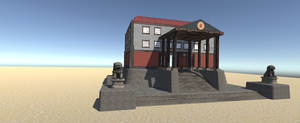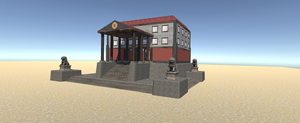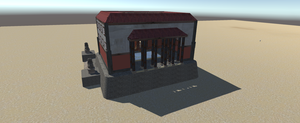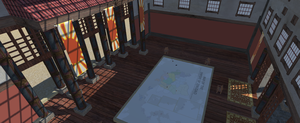Imperial Guang Palace: Difference between revisions
No edit summary |
No edit summary |
||
| Line 41: | Line 41: | ||
===Grand Teahouse=== | ===Grand Teahouse=== | ||
===Gate of Sisera's Wrath=== | |||
The Gate dates back to the era of the Duchang Emperor and were moved to the palace when it was constructed. When opened, it indicates he start of a war, but when closed, it indicates a period of peace. | |||
Revision as of 10:40, 28 December 2016
The Imperial Daocheng Palace is the home of the Heavenly Light and the seat of the government of the Jingdaoese Empire. Located in the capital city of Daocheng, the palace and surrounding grounds served as the spiritual and political center of the entire Empire. The palace is a superb example of traditional Jingdaoese architecture and its massive scale makes it unlike anything else in the Realm.
The Palace and surrounding grounds were, in fact, a city on their own. Therefore, the Palace is divided into a restricted quarter (mainly the living quarters of those belonging to the Household), a Forbidden quarter (government buildings) and the Divine Forbidden City (only accessible for the Emperor and His most loyal staff).
Outer Court
Entrance into the Daocheng Palace. Used as a public courtyard for military ceremonies and religious rites.
Restricted City
Temple of Eternal Peace
Imperial Shrine
Royal Residencies
Living Quarters of Governors
Living Quarters of the Household Staff
Jade Teahouse of the Double Eagle
Garden of Outer Peace
Forbidden City
War Council
Imperial Household Administrative Building
Zhou Administration buildings
The Three Ministries & Eleven Secretariats
Garden of Internal Peace
Grand Teahouse
Gate of Sisera's Wrath
The Gate dates back to the era of the Duchang Emperor and were moved to the palace when it was constructed. When opened, it indicates he start of a war, but when closed, it indicates a period of peace.
Inner Forbidden City
Heavenly Palace
Half of it is in the Forbidden City, other half in the Divine Forbidden City. Diplomats and government officials, even the diwang, are only ever allowed in the forbidden part, never in the more forbidden part. Only the staff needed to maintain these premises are ever allowed there.





